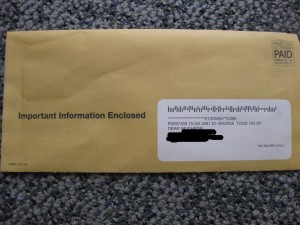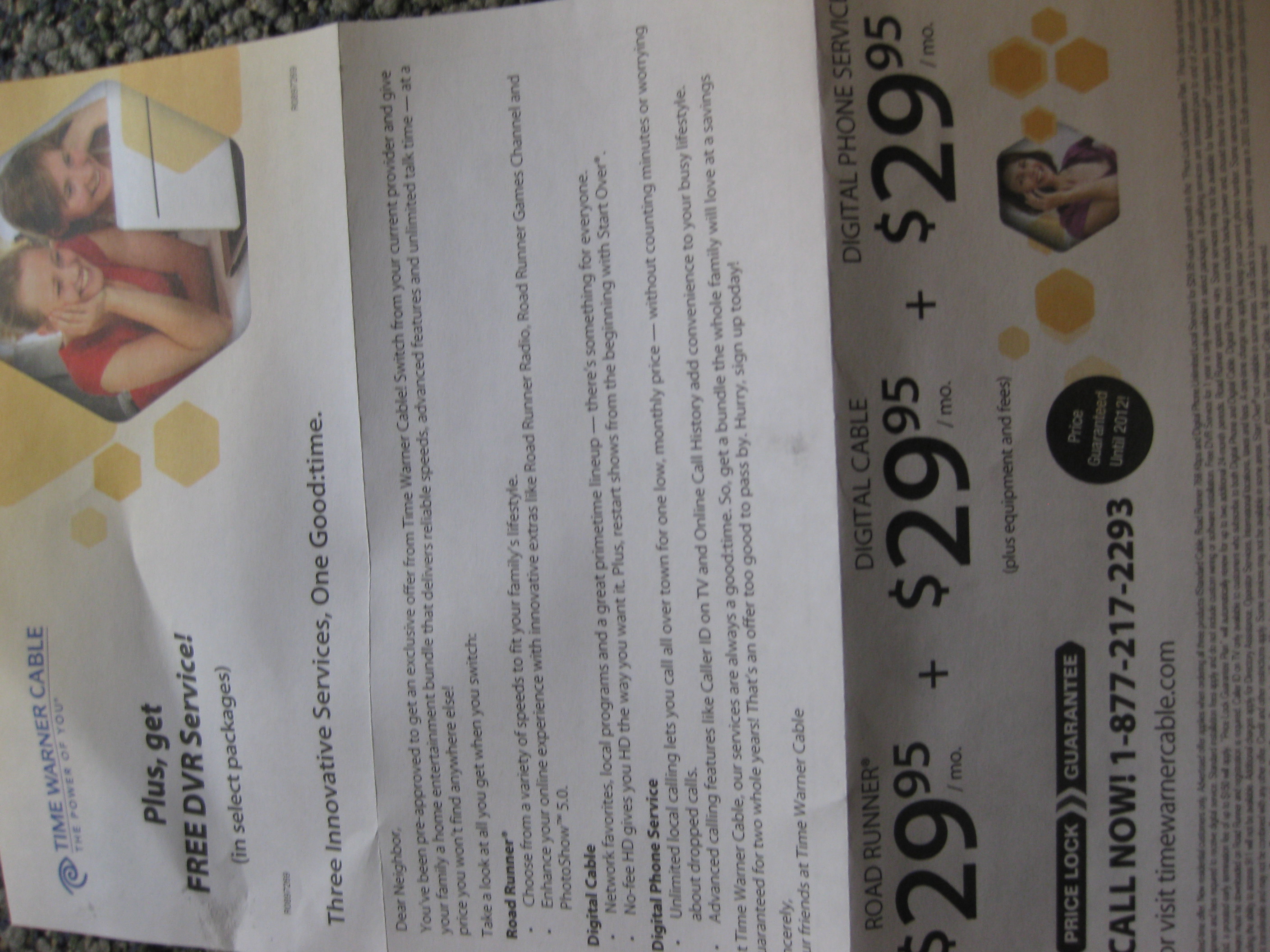Yesterday I arrived home from Oklahoma City (I was speaking at the Women Entrepreneurs Inspire conference) and when collecting my mail my attention was drawn to a brown envelope that said Important Information Enclosed. It didn’t have my name on it, instead it was addressed “Dear Neighbor”.
Hmmm – perhaps there is something important going on in my community that I need to know about.
Maybe there is something important from a neighborhood group, local chamber of commerce or the city.
Sadly that was not the case. It was a piece of junk mail from Time Warner Cable (note that they excluded their name from the front of the envelope).
Hmmm.
Dear Neighbor? I am not your neighbor. Do you live here? Are you a resident of my neighborhood? Actually, Time Warner, you aren’t. According to the dictionary a neighbor is “a person who lives near another”. You are not a person and you don’t live near me. Don’t try to trick me with false terminology to earn my trust and ultimately waste my time.
Important Information Enclosed. There is no important information. Although it does say that I have been “pre-approved” to get cable through them. How nice. A personal letter to let me know that they are willing to take my money and allow me to be a customer. The headline says “Three Innovative Services, One Good:time.” That isn’t important to me. It probably isn’t important to anyone. If you did have important information for me you probably could have used my name. My bank sends me stuff that says “Important Notice” and it usually is – changes to the terms and services of my bank or something relevant. Maybe I am more aware of how lame this is because I just finished reading Trust Agents.
The Immediate Results of Deception: Higher Open Rate
I would suspect that by writing misleading things on the envelope they probably get higher open rates (I opened it after all). I bet that Time Warner had tested a variety of different headings on their mailers and found that this got the highest open rates. You know what would have made it even higher? Subjects like “Someone in your family died” or “Audit notice from IRS”. Neither of these would be accurate either, but I bet the open rates are great. (OK, maybe I am being a little dramatic, but you get the point).
Social Media Application
It reminds me of things that you are seeing in social media (especially recently on twitter). I get a DM that says “click here to learn more about me” and it is an affiliate link to some MLM scheme or a get rich quick site. When you can effectively lie to people about what they are clicking on you can sometimes get more clicks. That is what those phishing scams do when they say “lol – is this you in the video?” and you click to a link that gets your twitter password and hacks your account. Misleading headlines can get clicks. That is for sure.
The Medium Term Results of Deception: Nothing
The problem with these types of bait and switch marketing tactics is that they don’t produce real results. So, I opened the “important information” from “my neighbor”. It was something from Time Warner. I didn’t even read it (except for the purposes of throwing it away). If I was interested in cable or changing internet I would have opened it with the correct label on the front. The fact that you tricked me to open it doesn’t make me more interested.
At the same time, I bet that some people who open it (even out of deception) do end up responding. I would assume this is the case, otherwise they probably wouldn’t do it. The question is “are those extra sales worth your reputation?”
Social Media Application
When you click on a link that wasn’t what it said it was, what is the impact? You probably navigate away pretty quickly. Sure, they stole a few seconds of your life, but after your confusion settled you probably didn’t stick around to check out their service. In fact, you were probably annoyed and unfollowed the person who sent you the stupid link.
The Long Term Results of Deception: Lack of Trust
The problem with these tactics is that they generate a lack of trust. The worst case scenario is that someone I me gets it and is annoyed enough to take some sort of action (blog post, emailing the company, etc). More likely is that it creates a lack of trust with the company. It makes the company look weak – they have to trick me to get me to read their stupid ad. It violates my trust since they lied to me. It makes me question their integrity. It is also disrespectful and insulting to me. It also has the impact of the boy who cried wolf – if they ever really try to send me something of value I probably won’t believe them.
Social Media Application
When someone tricks you with their spam links it violates your trust. You will probably stop following them and maybe even flag them as spam. Over time, as this grows, we’ll invent technical solutions to punish these people – like spam filters or sites like twitter freezing accounts. In the long run you lose out from this behavior. People won’t trust any information from you and will be hesitant to click on your links.
If Your Message Doesn’t Suck you Don’t Need Deception
Here is the thing – if you really have a great message or an “important offer” you shouldn’t have to use tactics to deceive me to get my attention. If the headline read “awesome deal to save you $$ on your cable and internet” I would have known what it was about and only opened it if I was interested.

































Unfortunately this method works. It doesn’t work on savvy marketers because they know better. But to the average consumer, they read a majority of their mail. It may be a 2.3 second read but still an impression nonetheless.
What’s even more unfortunate is the fact that we’re talking about it right now. Now Time-Warner just got another impression. It isn’t a positive one, but again, they know this. They know that most consumers actually have a hard time “holding grudges”.
A month from now, I’ll get one of these. Throw it away, and get another one next month. However, in the end…if my current broadband provider drops the ball. Who am I going to be looking for to replace them?
That’s right, the names that come into my head first. Remember, I forgot why Time-Warner popped in my head. I can’t associate a grudge I had for them two months ago for such a menial reason like tricking me into opening junk mail.
IMHO of course.
C/S
Hi Chris
You definitely make a great point here. If spam wasn’t effective than people would stop doing it. The Time Warner thing probably does work on some level (like awareness) as does social media spam and internet spam.
Thanks for contributing to the conversation and offering some perspective on the value 🙂
– Krista
Are TW’s people under the mistaken impression that people don’t already know their local ISP choices? Out of a pool of what, 3 or 4? Awareness is great for a new product, but not as important for a well known small pool vendor where most people who know what an ISP is know their choices, and the rest of them listen to some technical friend.
I’ve been saying this a lot lately, if your product is good people who are aware of it will buy it. If it sucks, then no amount of convincing will bring them to your side.
Once again, it comes down to simple morality. Are you going to be good or bad? Are you going to make the world a better place, or sacrifice anything in the name of profit?
Companies need to decide whether or not they’re going to be a positive source of information and contribute to the world with the best product they can give, or if they’re going to try to trick people into buying things they don’t want, don’t need, and don’t like.
If you read time warner’s reviews online, you’d know that much like comcast they’re fairly hated by their customer base. For this reason, they’ve decided that its easier to take advantage of people and mislead their potential clients, as opposed to spending that time and energy building a better service, or offering what people actually want in a compelling way. I’d be willing to bet that they get more eyeballs this way, but if they were to offer 50% off your bill on the envelope, they’d get more INTERESTED customers. This is another case of awareness marketing gone bad. More eyeballs is way less important than more interested eyeballs. I’d pay 10x more for a lead that I was sure was looking to buy compared to some random person I had to trick to even look at my offer.
This kind of marketing does work, and that is sad, but given the funky data collection I’ve seen so far in the ad biz, I wouldn’t be surprised to find that a more rigorous scientific data collection would result in more accurate results. The subliminal stuff is overrated, ESPECIALLY now that we live in a world where more and more consumers are leveraging the Internet to become super informed buyers. Endless repetition, brand recognition, and all those other “tricks” are becoming less effective and this has been supported by many recent studies focusing on young people who simply don’t trust advertising at all unless its dead honest or from a trusted source. This kind of deception does more damage than its worth in the long run.
Will
Thanks for sharing your very well thought out comments. I think that you are right – awareness is probably not the part of the purchase cycle that they need to focus on, so perhaps they can better spend their ad dollars elsewhere.
Additionally, I think you are dead on in your comment on spending with existing customers (I am currently reading Joe Jaffe’s Book Flipping the Funnel which talks about this).
Thanks so much for contributing!
– Krista
AMEN…and not just to mailings! One more recorded telemarketing call that promises “important information regarding my account,” or “vehicle warranty updates” and I might scream!
I have actually remained on the line and tried to get a live person on one of the credit card information calls (twice) and no one ever answers! How is that an effective use of marketing dollars?
As always, thanks for your thoughtful writing!